Eldritch Review
Call me old-fashioned, but I think roguelikes are one of those genres that just shouldn’t mix – at least, not without some serious care and preparation beforehand. Oh, it always starts with some indie auteur designer breathlessly describing his killer idea to his mates over the share house table, eyes ablaze with visions of replayability on a shoestring budget, but more often than not the finished product just ends up crippled by compromise; an uncomfortable marriage where the colourful variation and depth of roguelikes is toned down by the sheer monumental task of implementing that much complexity in a game that isn’t just an arrangements of tilesets and a primitive text parser. Still, lightness of roguelike elements aside, Spelunky was great, wasn’t it? Eldritch could be quite brilliant, especially once you hear about its inspirations and start salivating a little bit.
Having the game described to you, you might get an inkling that its premise was largely assembled by having the developers read out a list of their favourite games in the world and combining them together, Mad-Libs-style. Consequentially, it’s a first-person stealth-action game with its lineage in the Looking Glass Studios stable – particularly the old Dark Engine juggernauts, Thief II and System Shock 2 – which includes roguelike elements, naturally, cube-centric environments of the sort Minecraft wrenched into the limelight, and just the faint whiff of Dishonoured about its movement system from time to time. Oh yes, and the presentation takes more than a few cues from the works of H.P. Lovecraft, presumably because somebody had been playing Quake at some point. But will this be a mangled train wreck of conflicting design philosophies, or a seamless weave of brilliance that was fated to be?
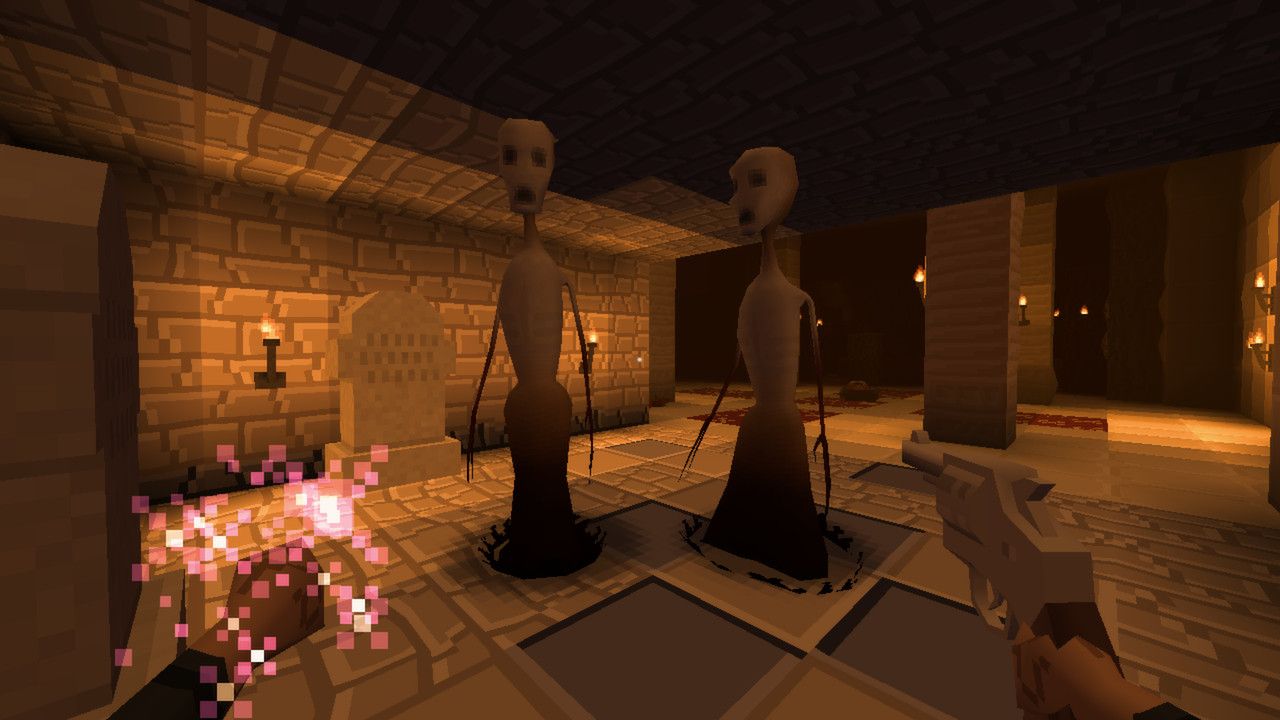
You can tell straight away what it won’t be praised for: storytelling. Eldritch dumps you straight into the hub world – a cavernous occult library with mysterious floating books – with nary an introduction to itself, and lets you explore the place, uncovering the secrets of the world and your purpose here as you progress through the game. Conceptually I think this could have been quite effective; a way to let players submerge themselves in the plot as much as they wanted, having nice little asides nestled away in the pages of the many floating books that hover above the library’s empty tables, but it gets let down by a severe lack of actual writing to fill their pages. Four paragraphs detailing the history of the library get spread out throughout its echoing space, repeated countless times throughout the many books, and four entries from the journal of an explorer are distributed throughout the game at various fixed points. It’s all very sparse and, in the case of the journal entries, deliberately ambiguous. Eldritch sort of implies that you are really just part of a big cycle, and it’s possible that the explorer in question is just a previous incarnation of yourself, but ultimately the few lines of text are just a flimsy framework to keep the gameplay from spilling out into the realm of meaninglessness. This is turning out quite a lot like a roguelike already, isn’t it? I can’t be the only one here haunted by visions of Nethack’s expository text screen.
Blast the story, then, eh? Three expectant pedestals, four unearthly worlds located within the pages of the library’s books, three mysterious glowing objects containing the disembodied souls of the most famous of Lovecraft’s nasties: Dagon, Nyarlathotep and Cthulhu. You must use your wits and whatever you can loot off the ground to shoot, stab, sprint and sneak your way past the entire population of Innsmouth in the pursuit of your goals. Off you go, matey.
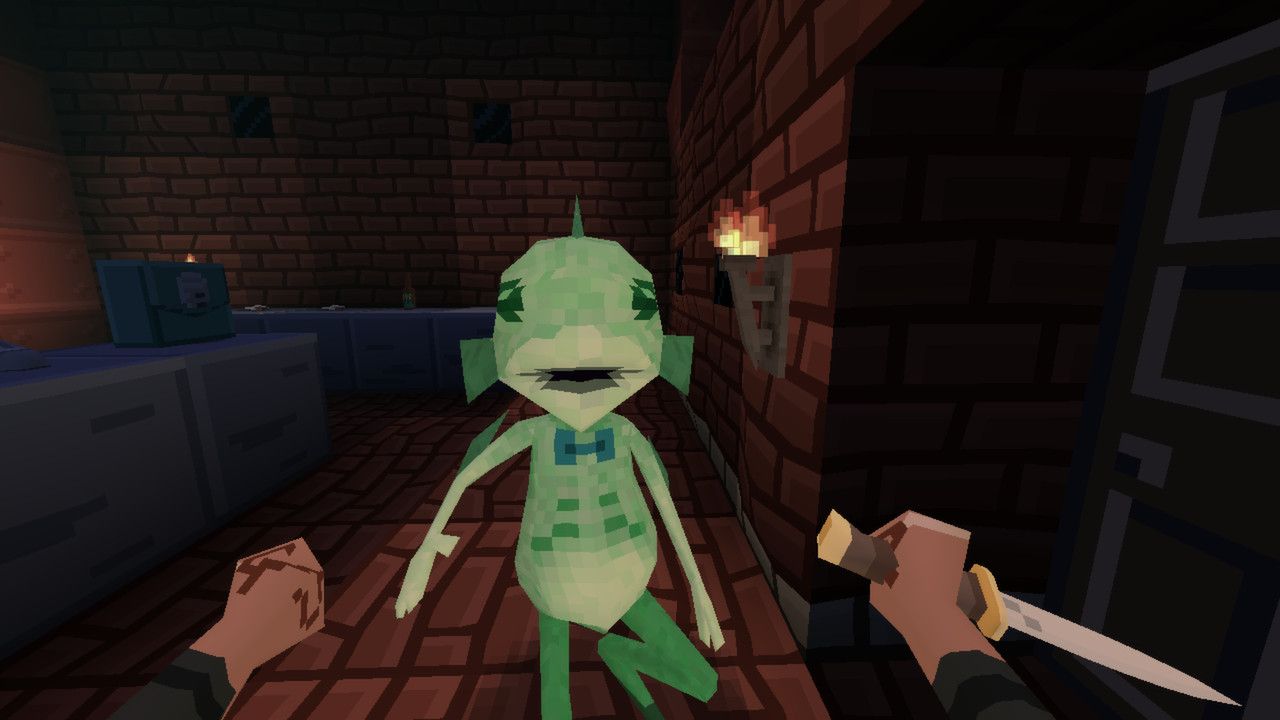
Four levels doesn’t sound like much – and it isn’t, believe me – but the game’s saving grace is the touted roguelike world generation, which promises that tasty dose of replayability and – to a certain degree – delivers. Essentially it’s the same technique Spelunky used, where for each floor the game takes a big pile of pre-fabricated rooms, shuffles them around and slots them neatly into a four by four grid. It’s not quite as exciting as the approach seen in more traditional roguelikes, but to the game’s credit it’s surprisingly effective at stitching things together such a way as to make each play-through feel unique, creating non-linear environments with plenty of paths, wide-open spaces, narrow corridors and cramped crawl spaces. My only sticking point is that occasionally the game drops the ball and generates a level that’s near-impossible to progress through without blasting a hole somewhere in the terrain, jump-starting a tiresome scavenger hunt for a bundle of dynamite in the rooms you just passed through. It only happens once in a blue moon, though, so I wouldn’t worry about it too much if I were you.
Getting down to the actual business of traversing Eldritch’s worlds, you find a mostly solid experience. On the face of it, all is well: navigate the level using the map and (if you have one) a compass, sneak around or confront your foes, pick up upgrades and weapons along the way. Spells can be obtained by consorting with stone statues, allowing you to briefly turn invisible, unlock doors, or teleport at will, for example One interesting point to note is that spells – and many upgrades – will, upon being used, consume your artifacts, the currency of choice in the world of Eldritch. Quite a stroke of clever design, you see, because it forces the player to consider every use of their power carefully. Not only does it drain a limited resource, but every cast of a spell rests heavily on the player’s mind, knowing that a dungeon store selling a revive kit could be just around the corner. At least that would be the case, were it not for the one tiny problem I’ve been keeping out of the limelight that sits on the gameplay like a mouse dropping on an otherwise clean dinner plate.
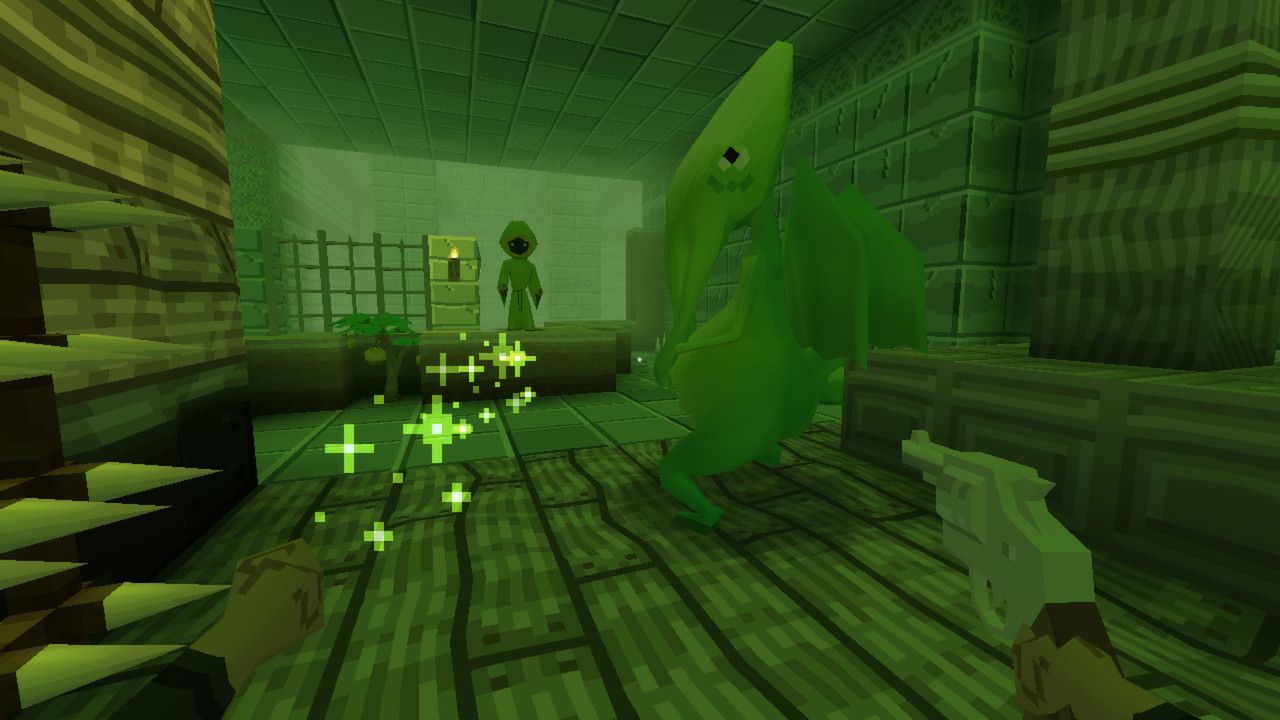
Eldritch is just too sodding easy. Not ‘easy for a roguelike’, or ‘easy for an indie game that doesn’t have to cater to a widespread audience’, both of which are petty complaints that could be deflected, but the rather more serious ‘it’s just too easy, period’. Blame can mostly be pinned on the yawning chasm of power between you and your foes. You only have three hit-points to start with, meaning that you can still be easily killed if you make a silly mistake, but your basic Eldritch player can sprint insanely fast without any fear of running out of stamina, climb ledges in an instant, bunny-hop at Mach 3, slide under obstacles and, with the acquisition of just a titchy pocket knife, carve up almost any passing monstrosity in a matter of moments. In a first-person shooter I would have adored a system of motion like this: it feels fluid, fast, unsullied by contextual movement or extensive animation, and indeed I spent a shameful amount of quiet thinking time just aimlessly parkouring around the hub library. In a game like Eldritch, though, such a level of capability causes all sense of vulnerability to swan-dive into an empty swimming pool. This condition only worsens when you begin to understand the mental extents of your obstacles.
Actually, the amorphous cloud of bitcode manipulating the AI is really quite competent – in the sense that their behaviour is consistent and logical within the bounds of their simple range of actions – but they’re so slow on the uptake and easy to evade that they’re scarcely able to perceive you as a threat. On the occasion that they do before you’ve diced them to pieces, the most they can do is try to chase you down and give you a good slap (essentially impossible, since you can outrun anything that doesn’t make use of gas-turbine engines) or fling fireballs with all the gusto of a pensioner with a paper plane. Even the indestructible Shoggoths or the Weeping-Angel-esque stone lizard men are mere annoyances to be granted a moment’s care and then forgotten about. These are supposed to be horrific abominations from beyond the veil of madness, not harmless waddling toys to be disregarded as you freely speed on by. It felt like I was in a Looney Tunes cartoon at times, instantly flummoxing my pursuers by running around a corner or dashing into a room and hiding behind the one piece of solid terrain within it. None of this is helped by the fact that your foes are incapable of using ladders or jumping up and down perfectly safe ledges. Who would’ve thought that one of the side effects of joining an ancient cult was acute vertigo?
Perhaps that’s being overly critical. After all, Eldritch does concede an unlockable hard mode upon finishing the game – they call it NG+, but you can use it from the start of a playthrough so the whole point of designating it as NG+ goes down the toilet – and while it feels like a slipshod solution at times, it does indeed prop up the difficulty curve considerably. It’s fairly apparent that all the mode does is fiddle with some sliders somewhere in the code – health, damage, reaction time, spawn rates of enemies and items – but it works out positively in the end. You can still get into minor scrapes and carve up isolated lesser enemies like slimy otherworldly turkeys, but diving head-first into a room full of unaware horrors is much more likely to leave you as food for the fish-men, and it’s considerably harder to acquire the necessary equipment to even attempt that in the first place. Consequentially, hiding and running away rapidly becomes the strategy du jour for dealing with foes, which – as a devoted fan of the Thief series – I personally warmed to extremely quickly.
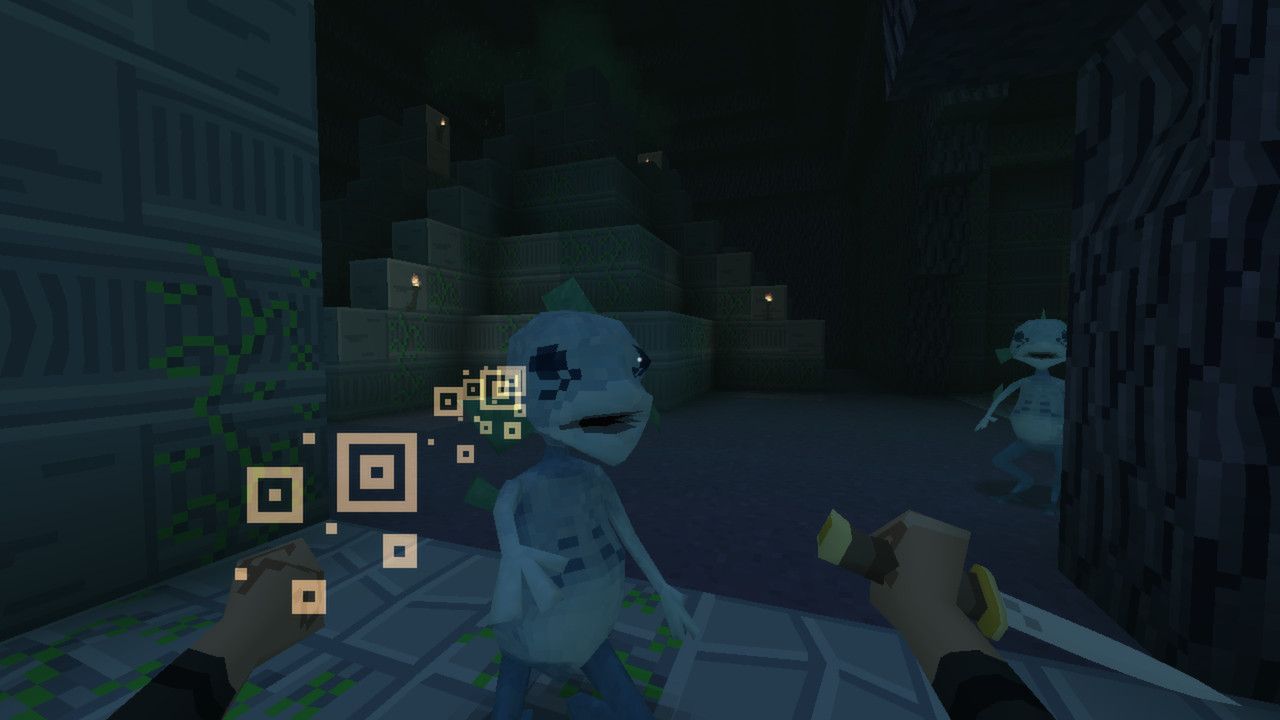
So why, if this mode’s impact on the game’s experience is entirely positive, are you forced to go through the menial task of proving yourself worthy of it? The game is not extensive nor hostile enough for its completion to be considered a challenge, and even if it was, elevating a difficulty mode into the realm of unlockable content is an insidious decision at best. This is a dreadful example of artificial game lengthening, holding what ought to be an essential feature just out of reach until you’ve gone through the whole thing at least once. Being forced to complete the game before it actually gets its claws out also means that you’ve already seen essentially everything, so there’s hardly any incentive to play the harder difficulty mode beyond sheer masochism.
While we’re in the general neighbourhood of harmlessness, why the cutesy Lovecraftian aesthetic? I won’t rag on this more than necessary – mostly because whiny demands for next-gen graphics on every single thing that passes under our noses is exactly the wrong message for the gaming community to send to developers – but the novelty of de-clawing famous icons of horror into something fuzzy and appealing is something that legions of Deviantart users have long since worn away until only a stump remains where originality once stood. It’s not all that bothersome but it feels like the game skipped out on the chance to create some real tension, especially when the sound design surprisingly excels at putting you on edge. Between distorted, dissonant background hums, the occasional eerie off-key guitar strum and the unearthly grunts and wails of distant foes, Eldritch manages to create quite an effective atmosphere of lonely oppression in an unfamiliar place. What a shame it is, then, that everything evaporates the moment you realise that the most effective strategy for dealing with Cthulhu’s little cousin is to rush forward and empty your six-shooter into his tentacle-ridden face.
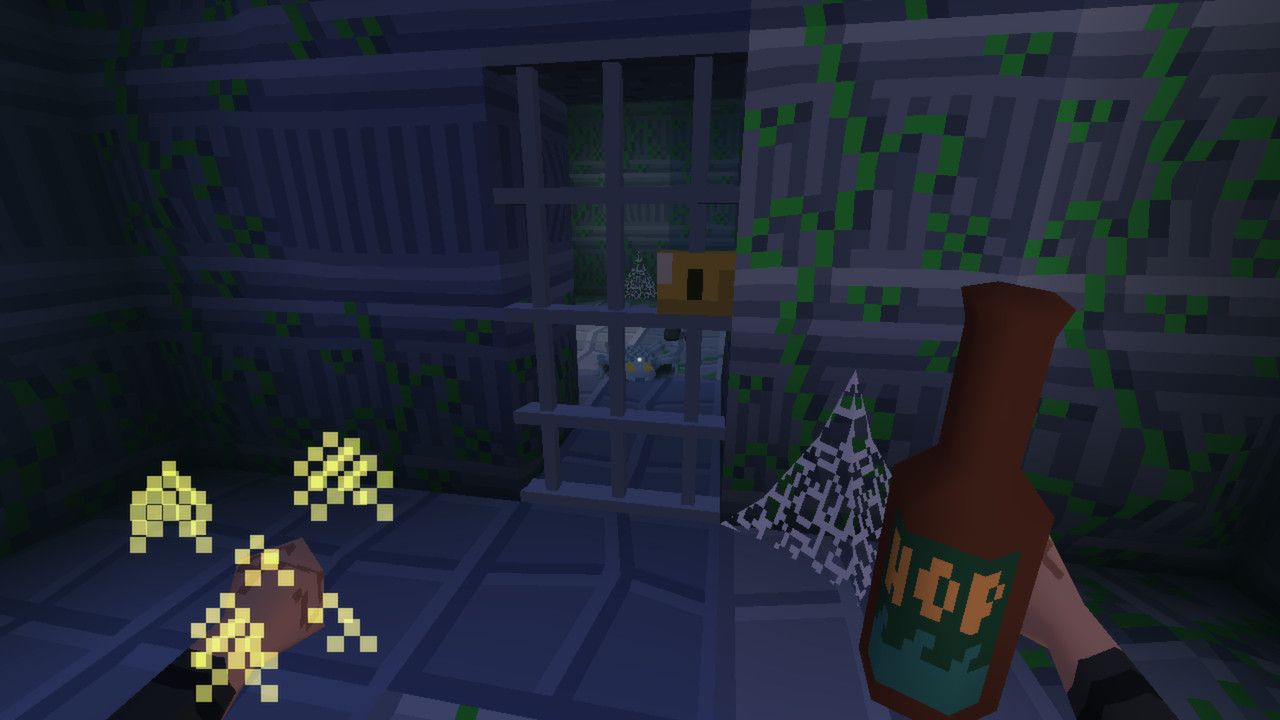
Occasionally, through fault of your own or simple misfortune, you will die, and this is where the game’s most perplexing feature comes into play: permanent death. I feel that this was something thrown in as part of the game’s pretensions to being a roguelike, but sadly misses the point somewhat. Perma-death isn’t merely a way of universally raising the stakes, because in order for it to feel threatening it first has to have something to threaten the player with. In a traditional roguelike with heavy RPG elements this made sense, since your character was something that became more valuable over time thanks to the accumulation of better weapons, armour, loot and spells, not to mention their progression through the extremely lengthy game world. Knowing that one bad move could throw all that effort down the drain was what created the tension in such games. Eldritch, by contrast, has such elements toned down so heavily that dying doesn’t feel like much of a consequence. You can obtain spells and upgrades, yes, but only one spell and one of each type of upgrade, so there’s very little character progression to be protective over.
I’ve been rather unkind to Eldritch throughout this review, but that’s largely because it disappointed me. It’s Spelunky without the teeth; an insubstantial little window into a world of potential without the length or depth to really fill the shoes it picked out for itself. Call it ambitious, call it a high-budget idea for a low-budget game, but while it might fall short of its glorious vision it still lands a furlong or so ahead of whatever yard-stick marks the point of average. It’s an indie game too, so it’s cheap as chips if you’re into the whole value for money thing. Blast through it in an hour or so, pick up the NG+ mode and play it in the quiet moments between other games.
Oh yes, and if you find the secret level, please let me know. I’m still looking for the wretched thing.
